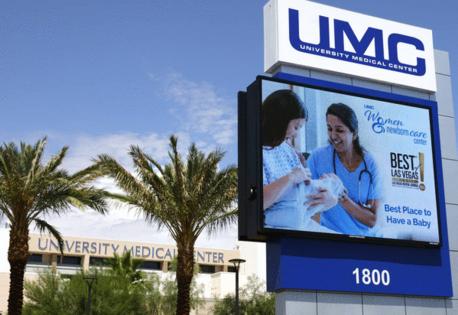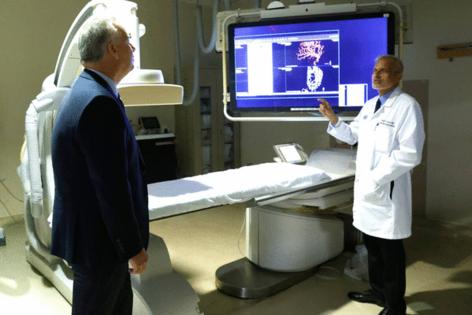How will 'Big Beautiful Bill' impact health care in Nevada?
Published in News & Features
President Donald Trump signed the first successful rollback of the country’s major health care programs into law on the Fourth of July, and some major changes are expected to be felt in Nevada over time.
Known as the One Big Beautiful Bill Act, the reconciliation package includes critical policy changes, from ending taxes on tips to extending Trump’s 2017 tax cuts. It also cuts federal Medicaid spending by about $1 trillion over the next decade.
Its passage marks the biggest change to the U.S. health care system since the passage of the Affordable Care Act 15 years ago, according to Larry Levitt, the executive vice president for health policy at KFF, a national health policy think tank.
The new law is expected to affect both patients and Nevada’s hospitals, though it may take time before the effects are felt, according to medical providers and national and state health care experts.
“We’re not all going to wake up one morning and find millions more people uninsured,” Levitt said in a recent media briefing. “Changes to Medicaid and the (Affordable Care Act) are going to roll out bit by bit over the next decade.”
Some Nevadans will lose coverage
Nevada’s Democratic members of Congress estimate over 110,000 Nevadans will lose coverage as a result of the bill. The nonpartisan Congressional Budget Office estimated in June that 11.8 million people will become uninsured nationwide by 2034.
That number is expected to be slightly lower when the Congressional Budget Office releases final numbers, though the change will still be staggering, Levitt said.
The White House claims there are no true cuts to Medicaid, arguing the bill “protects and strengthens” Medicaid for those who rely on it while “eliminating waste, fraud, and abuse.”
However, local and national health care experts say the provisions will indirectly cause people to lose coverage through the law’s extra burdens to receive and maintain coverage. They’ll have to renew their Medicaid coverage every six months instead of annually, and most will have to comply with a work requirement.
Starting Jan. 1, 2027, most adults under 65 who signed up for Medicaid through the Affordable Care Act must demonstrate “community engagement” through working, volunteering, enrolling in an educational program or participating in a work program for at least 80 hours a month.
Some people are exempt from the work requirement, including people with disabilities, pregnant women and parents with dependent children 13 years or younger.
Sharon Chamberlain, CEO of the health care center Northern Nevada HOPES, worries eligible people might lose coverage because they can’t handle the administrative burden of proving they work.
“These are people that are part of our community,” she told the Las Vegas Review-Journal. “They’re the working poor, they’re the folks that support the service industries, etc., and they’re not going to have access to health care any longer.”
Some immigrants, including some who are lawfully present, will also lose care. Medicaid eligibility will be canceled for some refugees and asylum seekers starting Oct. 1, 2026. Other immigrants, including those with temporary protected status, will no longer be eligible for Medicare beginning 18 months after the enactment of the bill.
Republican congressional leaders have framed the changes as necessary. A June 3 press release from Republican House Speaker Mike Johnson referenced an American Enterprise Institute analysis that looked at how non-disabled, childless Medicaid recipients between the ages of 19 and 64 who are not in school spend their time. “For Medicaid recipients who do not report working, the most common activity after sleeping is watching television and playing video games,” the AEI’s Kevin Corinth wrote in a May 29 post on the AEI’s website.
“You don’t want able-bodied workers on a program that is intended, for example, for single mothers with two small children who’s just trying to make it,” Johnson said on CNN in February. “That’s what Medicaid is for, not for 29-year-old males sitting on their couches playing video games.”
Hospitals are bracing for impact
Hospitals will see a substantial reduction in revenues from Medicaid patients — who make up 31% of inpatients across the state — and will have to provide more unreimbursed care in Nevada, said Patrick Kelly, president and CEO of the Nevada Hospital Association.
Health care providers may have to cut staff or services to stay afloat, though they’re not at that point yet.
Hospital representatives pointed to the new law’s changes to state-directed payments and the provider tax program, which are tools hospitals use to help bridge the chronic underpayment of Medicaid care, as causes for concern.
State-directed payments, often used by public hospitals like Southern Nevada’s University Medical Center, allow states to direct managed care organizations to pay medical care providers specific rates. The bill caps those payments in Nevada at 100% of the Medicare rates, meaning that hospitals will receive less reimbursement than they have been receiving for caring for Medicaid patients.
The provider tax program, which many private hospitals use, allows states to tax hospitals and redistribute the tax revenues back to the hospitals with matching funds from the federal government. Beginning in 2028, that provider tax will gradually fall from up to 6% of net patient revenues to 3.5% by 2032. Eliminating provider taxes and by extension reducing federal matching payments is estimated to save the federal government more than $600 billion over the next decade.
“That’s going to be a big cut for us,” said Blayne Osborn, president of Nevada Rural Hospital Partners, an alliance of 13 small and rural hospitals in Nevada.
UMC, the state’s only public hospital, is reviewing its expenses line-by-line, looking at its staffing, supplies and utilities, its CEO Mason Van Houweling told the Review-Journal.
“Although we’ve not really finalized any staffing or service line adjustments, it’s just important to know that we are preparing to do that,” Van Houweling said.
Northern Nevada HOPES, which serves over 20,000 patients (40% of whom are Medicaid recipients), is trying to diversify its funding sources and focus on different types of patient populations that will not be impacted by the bill, Chamberlain said.
“We are working on contingency planning right now,” she said. “What we do know is that it will certainly change the way we do current operations, and we will definitely need to rely much more heavily on donations and support from the community.”
Nevada Rural Hospital Partners is trying to understand the bill’s impact on the state’s rural hospitals, and what flexibility states will have on rolling out the provisions.
The “big, beautiful” law adopts the Rural Health Transformation Program, which provides $50 billion over five years to states to improve health care outcomes for rural residents, though experts worry the temporary program won’t fully offset rural hospitals’ permanent cuts.
Osborn said the program looks promising and could benefit Nevada; but overall, he described it as a Band-Aid solution by Republicans, knowing “there’s going to be hospitals — rural hospitals in particular — feeling the hurt.”
“Does it fully offset it? It’s way too early to tell,” he said.
Don’t panic
Hospital representatives and public health experts say the changes aren’t a cause for Nevadans to panic.
Many of the changes enacted in the legislation won’t happen immediately. Some of the biggest provisions will not take effect until 2027 and 2028. And the fight from opponents isn’t over; members of Congress and hospital lobbyists hope to make changes, including repealing certain provisions of the new law.
Sen. Josh Hawley, R-Mo., introduced legislation Tuesday to repeal some Medicaid provisions, including the changes to state-directed payments and the provider tax program. The bill would also increase funds of the rural health transformation program.
Nevada Medicaid Administrator Stacie Weeks is still assessing the final provisions of the legislation and its impact on Nevada’s Medicaid and Nevada Health Link, a resource helping Nevadans find insurance plans.
Weeks, who was unavailable for an interview, told Medicaid members in an email following the bill’s passage that there will be no changes for at least nine to 12 months to existing eligibility, coverage or benefits for Nevada Medicaid as a result of the passage.
When asked for comment, Gov. Joe Lombardo’s spokesperson deferred to the governor’s July 3 statement about the passage of the bill in which he said that his administration continues to assess the bill, and that “Nevadans should be excited about the potential impacts of tax cuts, investments in small businesses and American manufacturing, and efforts to help secure our border.”
The Nevada Republican Party couldn’t be reached for comment. Asked about the health care impacts of the bill in Nevada, Clark County Republican Party chair Jill Douglass said she did not feel it was in her area of expertise, and declined to comment.
The Nevada Health Authority will hold a public workshop July 28 to provide an update on its assessment of the impacts of the bill, according to the email sent to Medicaid members.
Health care experts and health care providers also hope Nevada’s Public Option, which starts Jan. 1, 2026, can help offset the number of people who lose Medicaid due to the federal changes. The public option will allow Nevadans to purchase a health insurance plan through the Silver State Health Insurance Exchange or directly from participating health carriers.
Health care providers also remain optimistic they’ll be able to adapt to the changes, and patients shouldn’t expect to see major changes to their care anytime soon.
“I think our hospitals, our folks do a great job,” Osborn said. “They’re incredibly resilient and are doing everything they can to keep services up and running at full steam, if you will, in each of their communities. So we’re trying not to panic anybody about this. We’re trying to be very methodical about it and get these things figured out.”










Comments